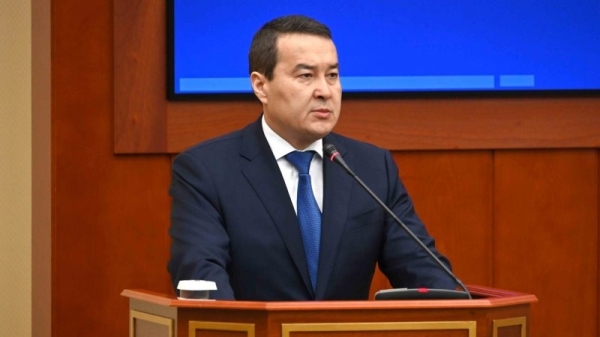Kazakh PM Smailov keeps job after snap elections

Following the snap elections in Kazakhstan, former Prime Minister Alikhan Smailov was reelected on Thursday (30 March) and formalised via a decree from President Kassym-Jomart Tokayev. He has now to propose ministers to be voted by the Parliament on Friday.
Kazakhstan is coming close to a full reset of its political establishment following the tragic events of January 2022, now described as a coup attempt.
The lower house of parliament, elected when former president Nursultan Nazarbayev still had sweeping powers, was not due for election until 2026, which prompted Tokayev to call a snap vote held on 19 March.
Beefing up institutions
Seven political parties competed in the elections, and their outcome cemented Tokayev’s grip on power, allowing him to continue the much-needed reshuffle of the ruling elite
The most significant move by Tokayev after the unrest was the transition from a super-presidential form of government to a presidential republic with a strong parliament, via amendments to the constitution passed via a referendum on 5 June 2022.
Former president Nazarbayev has not been accused of being behind the unrest, but most of his key lieutenants are now evicted from power.
Re-elected Speaker of the Mazhilis, the lower house of parliament, Yerlan Koshanov, who is also chairman of the Amanat Party, on Thursday proposed Smailov’s candidacy as per rules which state the winning party can put forward its candidate for prime minister.
Smailov was re-elected with 82 votes for, seven against, and eight abstentions. He has headed the previous government since January 2022.
Tokayev commended Smailov in Parliament.
“He is a very professional and experienced specialist, a very hardworking person. I think he knows very well the tasks assigned to the government, therefore I think he can be entrusted with the Prime Minister’s post,” the president was quoted as saying.
Smailov, 50, a mathematician by training with a career in administration, thanked the president for his trust.
“First of all, we will implement the president’s election manifesto and the program of the Amanat party. We will also consider the constructive proposals of other parties and members of Parliament, the business community and citizens,” he noted.
Kazakhstan is gradually abandoning the de facto one-party system which showed its shortcomings under Nazarbayev.
The priority tasks Smailov highlighted are to bring economic growth to 5% in the medium term and reduce inflation twofold by the end of this year. In January 2023, the annual inflation rate in Kazakhstan reached 20.7%.
The focus will be placed on economic diversification, a saturation of the Kazakh market with domestic goods and growth in the production of non-commodity goods with high-added value.
“Comprehensive measures to support entrepreneurship and improve the business climate, address pressing business issues, ensure employment and increase the real incomes of our citizens are among the main areas of the government’s work,” the prime minister said.
He pledged that the government would work to increase the capacity of the transport system of Kazakhstan and develop international transport and trade corridors.
A challenging environment
Landlocked Kazakhstan attaches utmost importance to international corridors to export its goods to the West, bypassing Russia’s territory, now under Western sanctions because of its invasion of Ukraine.
According to Smailov, the focus on education and healthcare will include improving the efficiency and quality of services, further digitalisation and the introduction of a single state digital platform.
The government will seek to address the tasks set by the president for the country’s socio-economic development, improving the quality of life and the population’s well-being.
“We are focused on well-coordinated and effective work in close cooperation with the Parliament,” Smailov concluded.
Tokayev told MPs on Thursday that Kazakhstan needs to gain a foothold as a key regional investment hub.
The president emphasised that the government should expand economic freedom and reduce the state’s role in market processes. These approaches, he said, will increase the institutional maturity of Kazakhstan and its resistance to various internal and external shocks.



